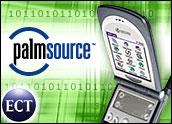
PalmSource has released two operating system updates — one major and one minor. PalmSource’s Cobalt is an almost entirely new OS aimed at giving enterprise users more flexibility, while Garnet is a collection of minor updates to an earlier version of the popular Palm operating system.
The company said its Cobalt OS features multitasking capabilities that will be key for corporate-computing environments in which users work with multiple applications, such as telephone, e-mail, calendar and contact applications. The new Garnet OS, more a collection of networking updates than an entirely new OS like Cobalt, picks up where version 5 of the Palm OS left off. PalmSource’s strategy with Garnet is to build on the platform that is already familiar to developers.
“There is a whole base of developers that already know it, and I think [PalmSource] believes there is still plenty of life to be extracted out of that OS,” Forrester analyst Charles Golvin told TechNewsWorld regarding Garnet.
PalmOne and PalmSource
The new operating systems are among the first offerings from PalmSource, the software branch of the mobile technology company that split from its hardware side last year. The hardware company is called PalmOne and continues to manufacture PDAs and handheld devices, but it does not develop Palm operating systems.
PalmSource president and CEO David Nagel said the Cobalt OS will pave the way for new categories of smart mobile devices and software in enterprise, education and entertainment markets.
Forrester’s Golvin said the new OS represents Palm’s recognition of the need to move beyond the PDA category, adding that Cobalt will be able to expand into technologies beyond the classic handheld organizer. As PDA technology has been moving closer to the capabilities of the traditional laptop, there has been a great need for enhanced operating system features.
Golvin said the new devices on which Cobalt could run might include mobile game devices (such as those from Tapware), ruggedized devices (such as those from Symbol) and job-specific systems used in vertical industries for specific purposes (such as electrical or medical applications).
Destination Unknown
Yankee Group analyst John Jackson said Palm does not know what the new devices enabled by its Cobalt operating system will be. But he stressed that this opinion is a compliment to the company’s ingenuity.
“Palm understands what a lot of the operating system vendors and device vendors understand — that just like there is no killer app, there is no killer device, so the trick is being flexible enough to enable whatever comes along,” Jackson told TechNewsWorld.
The mobile devices analyst called the new operating systems a good step for Palm, but he added that the key for any mobile OS vendor is volume.
Security and Switching
PalmSource has touted new levels of security, memory protection and multitasking capabilities in the Cobalt OS, which the company has said is a completely rewritten operating system that is now more compatible with Microsoft Windows.
For his part, IDC program manager Kevin Burden said wireless technologies and services have evolved to the point that PDAs are helping companies take advantage of real-time access benefits. The analyst also indicated Cobalt’s security management, scalability and flexibility will allow Palm to meet the demands of enterprise IT.
Golvin said the most significant feature of the new Cobalt is full functionality and multiprocessing that will allow users to manage multiple applications more easily.
“It works better and makes more sense when you think about the typical uses,” he said, referring to use of voicemail, notes, calendars and other programs. “The ability to seamlessly do application switching is a very powerful core capability that this OS enables.”
Flexibility for All
In the Garnet OS, PalmSource said it built on the Palm OS 5 foundation and incorporated several new features, including standard support for a broad range of screen resolutions, improved network communication and Bluetooth capabilities.
PalmSource, which also released new software development tools for both operating systems, said Garnet is designed to ease and streamline Palm-powered handhelds and smartphones at less cost. Golvin said that in Garnet, the company is offering more flexibility for device makers and subsequently for consumers who are not demanding the increased performance of the Cobalt OS.
“Not all users are thirsty for computing power,” he said. “They’re giving their customers a little more flexibility, and [Garnet is] more for designing devices for a particular function or particular need.”
Windows World, Penguin Platform?
Blue Nomad CEO Alexis Hinds said in a statement that the new multitasking, multimedia and security interfaces included in Cobalt serve to reaffirm PalmSource’s leadership position in the mobile space.
Golvin said Palm’s primary competition on the enterprise side will be the Windows Mobile platform, formerly Windows CE and now called Pocket PC. As for the consumer market, Golvin indicated Symbian likely will be Palm’s biggest rival.
The analyst added that there might also be increased competition from the Linux platform, as Motorola — while somewhat ambivalent about its smartphone intentions — has made noise about using a reduced version of Linux for mobile devices.





















































